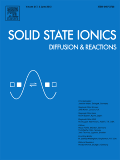
SOLID STATE IONICS
Scope & Guideline
Exploring the dynamics of solid state materials.
Introduction
Aims and Scopes
- Ionic Conductivity in Solid Electrolytes:
Research on the ionic conduction mechanisms in various solid electrolytes, including garnet-type, NASICON, and perovskite structures, is a core focus of the journal. This includes studies on defect chemistry, doping strategies, and phase stability. - Electrode Materials for Energy Storage:
The journal publishes significant findings on electrode materials for lithium-ion, sodium-ion, and other battery technologies. This includes investigations into the electrochemical performance, stability, and cycling behavior of novel electrode compositions. - Solid Oxide Fuel Cells (SOFCs) and Electrolysis:
Research related to solid oxide fuel cells and electrolysis is prominently featured, focusing on cathode and anode materials, electrolyte interfaces, and performance optimization under various operational conditions. - Polymer Electrolytes and Composites:
The development and characterization of polymer-based electrolytes and composites for applications in batteries and fuel cells are essential themes. This includes studies on structural properties, ionic conductivity, and mechanical stability. - Computational and Theoretical Studies:
Computational modeling and first-principles studies are utilized to understand ion transport mechanisms, defect formation, and material properties at the atomic level, providing insights that guide experimental research.
Trending and Emerging
- Solid-State Batteries with High Ionic Conductivity:
There is a growing emphasis on solid-state batteries, particularly those utilizing sulfide electrolytes and composite structures that demonstrate high ionic conductivity and safety advantages over liquid electrolytes. - Advanced Doping Strategies:
Research into advanced doping strategies to enhance the ionic conductivity of solid electrolytes has gained traction, with studies focusing on multi-doping and the use of novel dopants to optimize material performance. - In-situ and Operando Studies:
Emerging techniques such as in-situ and operando studies are increasingly utilized to understand the dynamic processes occurring during battery operation, providing deeper insights into material behavior under real conditions. - Environmental Sustainability of Materials:
Research focusing on the environmental impact and sustainability of materials used in energy storage technologies is trending, including the development of recyclable and eco-friendly materials. - Hybrid and Composite Materials:
The use of hybrid and composite materials that combine different functionalities (ionic and electronic conduction) is on the rise, with a focus on improving performance in energy storage and conversion applications.
Declining or Waning
- Traditional Ceramic Electrolytes:
Research on traditional ceramic electrolytes, such as simple perovskites without advanced modifications, appears to be waning as more innovative materials and composites are developed to enhance ionic conductivity and mechanical properties. - Basic Characterization Techniques:
There has been a noticeable decrease in papers focusing solely on basic characterization techniques for materials, such as standard X-ray diffraction or basic impedance spectroscopy, as the field shifts towards more application-oriented and advanced characterization methods. - Single-ion Conductors:
Research on single-ion conductors has diminished, possibly due to the growing interest in mixed ionic-electronic conductors and materials that provide enhanced performance in real-world applications. - Conventional Lithium-Ion Battery Materials:
The focus on conventional lithium-ion battery materials is declining as researchers explore alternative chemistries and materials that offer higher capacities and improved safety profiles.
Similar Journals
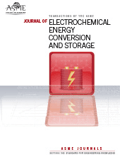
Journal of Electrochemical Energy Conversion and Storage
Empowering Energy Engineering for TomorrowThe Journal of Electrochemical Energy Conversion and Storage, published by ASME, is a premier platform for cutting-edge research in the fields of electrochemistry, energy engineering, and materials science. With an ISSN of 2381-6872 and an E-ISSN of 2381-6910, this journal aims to disseminate high-quality articles that contribute to the understanding and application of energy conversion and storage technologies. Notably recognized in the 2023 Category Quartiles as Q2 in multiple categories including Electronic, Optical and Magnetic Materials, Energy Engineering and Power Technology, and Mechanical Engineering, it reflects a strong academic impact within its field. The journal also boasts competitive Scopus rankings, highlighting its relevance and influence across disciplines. Operating under an open access model, the journal ensures that research findings are widely accessible, fostering collaboration and innovation among researchers, professionals, and students globally. As we move toward a more sustainable future, the Journal of Electrochemical Energy Conversion and Storage plays a critical role in advancing technologies that promise to reshape how we harness and utilize energy.

Energy & Environmental Materials
Pioneering Solutions for a Sustainable TomorrowEnergy & Environmental Materials, published by WILEY, is an esteemed academic journal dedicated to pioneering research in the multifaceted domains of energy, environmental science, and materials science. Since its inception in 2018, this journal has rapidly established itself as a leading platform, holding a prestigious Q1 ranking across multiple categories including Renewable Energy, Sustainability, and Waste Management, reflecting its significant contributions to advancing knowledge in these critical areas. With a robust Scopus ranking that positions it in the top percentile for Environmental Science and Materials Science, it caters to a diverse audience of researchers, professionals, and students seeking cutting-edge findings and practical applications in energy efficiency and sustainable materials. This open-access journal facilitates the dissemination of innovative research and aims to bridge the gap between scientific exploration and real-world solutions for a sustainable future. The editorial team encourages submissions that explore both theoretical and practical aspects, ensuring that every publication not only contributes to the academic landscape but also drives impactful change in energy and environmental practices.
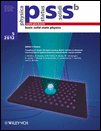
PHYSICA STATUS SOLIDI B-BASIC SOLID STATE PHYSICS
Illuminating Innovations in Basic Solid State ResearchPHYSICA STATUS SOLIDI B-BASIC SOLID STATE PHYSICS, published by Wiley-VCH Verlag GmbH in Germany, is an esteemed journal within the condensed matter physics sphere, covering pivotal advancements in basic solid state physics. With a rich history dating back to 1961, it serves as a scholarly platform for researchers, professionals, and students alike, providing insights into the fundamental properties and applications of electronic, optical, and magnetic materials. The journal currently holds a respectable Q3 ranking in both Condensed Matter Physics and Electronic, Optical, and Magnetic Materials as of 2023, indicating its impactful contributions to these fields despite its competitive landscape. While it does not offer open access, its comprehensive research findings are critical for those engaged in innovative material science research. With a convergence period extending to 2024, PHYSICA STATUS SOLIDI B continues to play a significant role in facilitating knowledge exchange and fostering advancements in solid state physics.
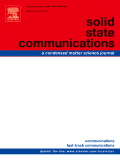
SOLID STATE COMMUNICATIONS
Fostering Collaboration in Solid-State ResearchSOLID STATE COMMUNICATIONS is a prestigious journal published by Pergamon-Elsevier Science Ltd, dedicated to disseminating cutting-edge research in the fields of Chemistry, Condensed Matter Physics, and Materials Chemistry. With an ISSN of 0038-1098 and an E-ISSN of 1879-2766, the journal has established itself as a vital resource for researchers and professionals seeking to explore the fundamental properties and innovative applications of solid-state materials. As of 2023, it boasts a commendable standing, ranking in the Q2 quartile across its various categories, reflecting its impactful contributions to the scientific community. The journal is indexed in Scopus, further validating its relevance and quality, with notable ranks close to the median percentile in key areas. While SOLID STATE COMMUNICATIONS does not currently offer Open Access options, it remains a highly regarded source for rigorous scientific inquiry and open discussions, with a publication history dating back to 1963 and continuing to 2024. The journal serves as an essential platform for disseminating groundbreaking findings and fostering collaboration within the vibrant fields of solid state science.

Journal of Power Sources Advances
Exploring Breakthroughs in Electrochemistry and BeyondJournal of Power Sources Advances, published by ELSEVIER, stands at the forefront of innovative research within the fields of Electrochemistry, Energy Engineering and Power Technology, and Materials Chemistry. Having established itself as an Open Access journal since 2020, it aims to disseminate knowledge rapidly and widely among researchers, professionals, and students interested in the latest advancements in power sources technology. With an impressive impact factor and recognition as a Q1 journal in 2023 across multiple categories, it addresses key challenges and innovations in energy generation, storage, and materials development. The journal's commitment to high-quality, peer-reviewed content fosters a vibrant community for discussing breakthroughs that hold the potential to transform energy systems globally. The journal operates out of the Netherlands, enhancing its global outreach, while its strong Scopus rankings highlight its influential role in driving research within its scope. Journal of Power Sources Advances is the pivotal resource for those dedicated to shaping the future of energy sustainability and technology.
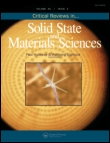
CRITICAL REVIEWS IN SOLID STATE AND MATERIALS SCIENCES
Elevating Knowledge Through Critical AnalysisCRITICAL REVIEWS IN SOLID STATE AND MATERIALS SCIENCES, published by Taylor & Francis Inc, is a prestigious journal dedicated to advancing the field of materials science through comprehensive reviews and critical analysis of existing literature. With an ISSN of 1040-8436 and an E-ISSN of 1547-6561, this journal serves as a vital resource for researchers, professionals, and students seeking in-depth understanding of solid-state phenomena and materials applications. Renowned for its high visibility in the academic community, it holds a Q1 ranking across multiple categories including Chemical Engineering, Condensed Matter Physics, and Physical and Theoretical Chemistry, showcasing its impact and relevance in the field. The journal spans its publication years from 1977 to 2024 and is highly regarded, holding prominent positions in Scopus rankings, making it a leading platform for disseminating critical insights and advancing knowledge in materials science. Although it is not an open-access journal, its rigorous peer-review process ensures the highest quality of articles, solidifying its status as a cornerstone for anyone engaged in materials research.
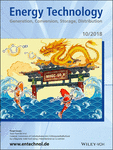
Energy Technology
Pioneering Insights into Renewable Energy AdvancesEnergy Technology, published by Wiley-VCH Verlag GmbH, is a prominent peer-reviewed journal dedicated to advancing the field of energy research and technology. With an ISSN of 2194-4288 and an E-ISSN of 2194-4296, this journal has made a significant impact in the energy sector, holding a Q2 category ranking in the Energy (miscellaneous) category for 2023, and proudly positioned in the 77th percentile within the Scopus ranking for General Energy. Since its inception in 2013, Energy Technology has consistently published cutting-edge research, innovations, and reviews that cater to a wide array of topics including renewable energy, sustainable technologies, and energy efficiency. The journal does not offer open access, yet it remains a key resource for researchers, professionals, and students who are committed to exploring the dynamic field of energy. The journal's efforts to disseminate rigorous scholarship make it an invaluable asset for anyone looking to contribute to or understand the future of energy-related technologies until 2024.

Solids
Fostering Innovation in Physics and Materials ScienceSolids is a distinguished peer-reviewed journal published by MDPI, dedicated to the comprehensive exploration of the properties, applications, and advancements in solid materials. Starting its journey in 2020, this Open Access journal provides a dynamic platform for researchers and professionals in the fields of physics, astronomy, materials science, and chemistry, enabling them to disseminate their findings to a global audience without barriers. With an emerging presence in the academic landscape, Solids has established a reputation reflected in its Scopus rankings, including a commendable position of #28 out of 81 in Physics and Astronomy and #83 out of 196 in Materials Science, demonstrating its impact and relevance within these vibrant fields. The journal's objectives extend to fostering interdisciplinary discussions and collaboration, making it an essential resource for those seeking to advance their understanding of solid materials and their innovative applications. Researchers and students alike are encouraged to contribute to this essential dialogue, engaging with the latest research and insights in solid-state science from around the globe.
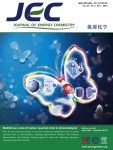
Journal of Energy Chemistry
Pioneering Discoveries in Energy ChemistryThe Journal of Energy Chemistry, published by Elsevier, is a premier international journal that has established itself at the forefront of research in the fields of electrochemistry and energy technology. With an impressive impact factor, this journal is classified in the Q1 quartile across multiple categories including Energy Engineering and Power Technology, Fuel Technology, and Electrochemistry, underscoring its significant contribution to advancing knowledge and innovation in energy systems. Based in the Netherlands, the journal offers open access to its cutting-edge research, allowing for broad dissemination and engagement among researchers, professionals, and students alike. The scope of the journal spans crucial topics from chemical energy storage to sustainable energy solutions, making it an essential resource for those looking to understand and contribute to the evolving landscape of energy chemistry.
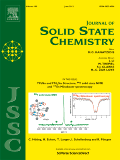
JOURNAL OF SOLID STATE CHEMISTRY
Unveiling Innovations in Solid State ResearchWelcome to the Journal of Solid State Chemistry, a prestigious publication that has been at the forefront of solid state chemistry research since its inception in 1969. Published by Academic Press Inc. Elsevier Science in the United States, this journal offers a rigorous platform for the dissemination of high-impact research articles and reviews in a wide array of categories such as Ceramics and Composites, Condensed Matter Physics, and Materials Chemistry, among others. With an impressive Q2 ranking across multiple categories in 2023 and a commendable performance in Scopus rankings—including a top position in Inorganic Chemistry—this journal serves as an essential resource for researchers, professionals, and students eager to advance their understanding in solid state phenomena. Although it does not currently offer Open Access options, the breadth and quality of the published research ensure significant visibility and scholarly impact. As we continue to converge into 2024, we invite you to explore groundbreaking studies that push the boundaries of knowledge in solid state chemistry.